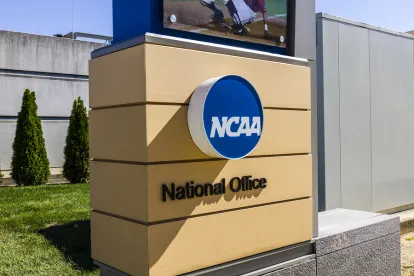On April 28, 2020, the NCAA Board of Governors established a framework of revisions to the NCAA’s rules that would allow student-athletes to receive compensation for the use of their name, image and likeness (NIL) under certain circumstances. This revision, which represents a potentially significant departure from the NCAA’s prior position regarding “amateurism,” may be in response to various legal and market challenges which have been exacerbated by the unprecedented financial strain resulting from the Coronavirus Disease 2019 (COVID-19) pandemic. Although the NCAA and its member schools are not expected to issue final rules regarding NIL compensation for student-athletes until the 2021 academic year, because the proposal may have wide-reaching impacts and create opportunities for student-athletes as well as the agents and lawyers who represent them, these developments should be monitored closely.
Collegiate athletics is a multibillion-dollar business. In 2018, for example, college sports programs earned more than $14 billion in revenue through ticket sales, television broadcast agreements, merchandise, and sponsorships. Although 2020 has seen a dramatic reduction in revenue from the cancellation of live sports, it is anticipated that these events will eventually resume in some form and continue to generate massive revenue. The revenue from college athletics is generated primarily from the football and basketball programs of so-called Power 5 conferences, which have lucrative broadcast agreements with the likes of ESPN, CBS and Fox. College football and basketball coaches are often the highest-paid public employees in their respective states because they can generate substantial revenue and recognition for their schools by building successful programs.
Despite the revenue generated by student-athletes, the NCAA has long taken the position that, to preserve the sanctity of athletic competition, student-athletes must remain “amateurs” and should not be considered employees. Although student-athletes may receive consideration from their schools in the form of scholarships, meals, and an expense allowance for travel, equipment, health care and other reasonable costs, under present rules, they are not allowed to receive consideration, meals, travel, or other items of value from third parties, agents, and/or representatives. In addition, hiring an agent or entering a professional draft may result in the loss of a student-athlete’s NCAA eligibility. The NCAA has staunchly defended its position through vigorous enforcement actions and penalties such as suspensions, rescinding scholarships, or restricting their eligibility to compete in NCAA athletics. In addition, the NCAA may punish member schools found to have violated its rules (primarily by suspending coaches, vacating championships and wins, and decreasing scholarship allotments).
The dichotomy between the immense revenue-generating potential of student-athletes and the NCAA’s position regarding amateurism has been criticized.
Over the years, there have been various legal challenges to the NCAA’s position regarding amateurism:
-
Ed O’Bannon v. NCAA (802 F.3d 1049 (9th Cir. 2015). In 2009, Ed O’Bannon, a former college basketball star, sued the NCAA for licensing the right to use his likeness in a video game without his consent. He also argued that the NCAA’s prohibition on student-athletes’ ability to earn compensation from their NIL rights was an illegal restraint of trade under §1 of the Sherman Act (15 U.S.C §1). O’Bannon prevailed in a 2014 trial where the district court judge ruled the NCAA’s position was a violation of antitrust laws and required that the NCAA establish a trust to pay student-athletes amounts for the use of their NIL rights following their departure from school. On appeal, the Ninth Circuit panel affirmed in part but denied the district court’s suggested remedy, finding that capping the consideration that could be received by a student-athlete at the cost of attendance plus reasonable expenses was permissible under the rule of reason. The Supreme Court denied cert review, leaving the NCAA’s current framework regarding amateurism in place.
-
In 2015, when members of the Northwestern University football team attempted to unionize, the National Labor Relations Board unanimously declined to classify student-athletes as employees.
-
Certain states have passed or proposed legislation that negate NCAA prohibitions on student-athletes monetizing their NIL rights. For example, in California, SB 206, the “Fair Pay to Play Act,” was signed into law September 2019; it bans schools in California from prohibiting student-athletes from hiring agents or accepting endorsement deals. The law goes into effect Jan. 1, 2023. Other states such as Colorado, Florida, Illinois, and New York are proposing similar legislation, in part so that their schools can remain competitive with California schools in recruiting. On a national level, there are proposals to amend the tax code to alter the definition of a qualified amateur sports organization or to create a national law allowing student-athletes to earn consideration from endorsements.
In addition to the legal challenges, as a practical matter, with respect to basketball where the NBA requires students to be one year removed from high school in order to be eligible for the NBA draft (although starting in 2021, students will be able to enter the NBA draft directly from high school), certain student-athletes have sought to play professionally overseas or join the NBA’s G-league rather than attend college. With respect to football, where there is no minor league alternative to the NCAA, players have not had similar flexibility.
Faced with this combination of challenges and the desire to avoid a patchwork state-by-state system of rules that could create an imbalance among its member schools, while the NCAA awaits a federally mandated solution, it is establishing regulations under which student-athletes may monetize their NIL rights without allowing a free market to develop.
During their April 28, 2020, meeting, the NCAA Board of Governors adopted the following framework:
-
Student-athletes will be able to earn compensation from the use of their NIL rights from third-party endorsements related to athletics (that do not involve any schools or conferences), social media opportunities, personal appearances, and new businesses.
-
Endorsement agreements may not contain any school or NCAA logos or marks.
-
Schools and conferences may not enter into endorsement deals with student-athletes.
-
Schools and their boosters may not provide compensation or enter into NIL endorsement deals for purposes of influencing recruiting.
-
Creating a review board to review the amount of compensation paid in individual deals to determine that such compensation is not deemed to be excessive.
-
Regulating agents and other advisors, such as attorneys, who represent these student-athletes in NIL endorsement agreements.
Following the meeting, the NCAA Board of Governors suggested the following timeline to implement a final revised NIL framework:
-
August 2020 –NCAA divisions should have their NIL proposals approved.
-
October 2020 – NCAA divisions should have draft final legislation.
-
January 2021 – The final legislation should be approved.
-
2021-22 Academic Year – Legislation should go into effect.
See NCAA’s Questions and Answers on Name, Image and Likeness.
As this timeline evolves and the various NCAA divisions prepare their proposed rules and legislation, there are several open questions. First, it is not clear how active the NCAA will be in regulating this market, but the NCAA appears concerned that a free market would have a detrimental impact on recruiting and competitive balance. If the NCAA seeks to aggressively regulate these agreements and compensation amounts, the NCAA may in effect preserve much of its status quo. Second, what role will Congress have in this NIL regime? The NCAA prefers a federal solution. In fact, the NCAA has requested that Congress establish a safe harbor for protection against lawsuits for violations of NIL rules; safeguard the nonemployment status of student-athletes; maintain a distinction between college and pro sports; and uphold diversity, inclusion, and gender equality. Student-athletes and schools alike will need guidance to navigate what is permissible in this evolving landscape.



 />i
/>i

